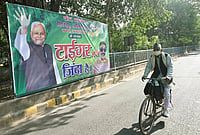Online teaching during the pandemic has seen the channels of communication between the teachers and students getting frequently disrupted. We must develop equitable mechanisms to ensure the screen doesn’t become a barrier and everyone gets his or her fair share
People mostly identify the Covid-19 pandemic as a curse that shook the foundations of the human race. Some also look at it as a blessing in disguise, an event that held a mirror to extant conditions, bringing human beings face to face with all that is wrong with how life has progressed on the planet. There is nothing wrong with either position for, like any other event, it impacted different people in different ways. As an academic and a teacher, I see the event through the lens of my own subjectivity and obviously, with my own set of biases.
Yes, Covid-19 was a tragedy of the worst kind. While I had read about the Holocaust, the bombing of Hiroshima and Nagasaki, the partition of our country, epidemics, wars, natural calamities and the destruction and deaths that they led to in different parts of the world, this was probably the first time since the 1919 plague that human beings have experienced such an overwhelming crisis.
Watching and hearing about people dying on a regular basis all around is not a situation particularly conducive to any kind of progressive activity, much less for an academic or educational one. Teaching cannot, after all, save a person on the streets from dying. At one stage it seemed pointless, even ridiculous, to carry on teaching when all that one encountered around oneself was suffering, desperation and death.
However, the positive part of being a teacher was that one could not let oneself be overpowered by or even preoccupied with the morbid all the time. One had a responsibility — to be positive and functional for one’s students — and that was what kept one going, not just as a teacher but also as an individual. In a class, whether online or in-person, a teacher needs to maintain a level of poise and equanimity that would keep the frazzled young people of varying class backgrounds from sinking any further into desperation and depression. And that is why when one looks at the pandemic situation as an educator, one carries a perspective that is much more complex.
The issue of boundaries was the first challenge. While earlier, one went to work and then came back home, the pandemic and the ensuing lockdown blurred these boundaries. One was working from home as well as working for home, and the predicaments as well as prepositions often overlapped and frequently got mixed up. But this was the least of the issues.
After being accustomed to classroom teaching for more than two decades, the sudden switch to online teaching was disconcerting as well as demanding. Disconcerting, because teaching is a humane job, perhaps a bit more demanding on the human component than many other jobs. And that is why having to function in the digital environment minus the human component that one was accustomed to has been a major vacuum. However, to be realistic, this is also the future we have been envisioning and talking about in our classrooms for some time now. And so, at the end of the day, you realise this is it — a future that was not unexpected, only that it has arrived rather suddenly. However, the rationalisation of the event does not resolve things once and for all. Every now and then you realize that there are missing transactions and missing channels of communication in these Zoom-ed classrooms. And that is a sad thing: teaching is one of the most rewarding professions in terms of how we connect with students and how they impact us with their curiosities, their enthusiasm and above all, their humanness and their love. All these transactions were significantly compromised in the digital setup. The screen became a ‘screen’ — a barrier. At times, one felt more like a content creator than a teacher and wondered what the difference was between one’s live digital teaching and a YouTube video on the topic.
But not everything has been uniformly gloomy. Teachers have surely been the biggest learners during the pandemic. As I mentioned earlier, teaching has the potential of providing an alternative perspective to survive any sort of morbidity. It creates and demands mechanisms to look for what you gain rather than what you lose. A digital classroom during the lockdown meant that a lot of time that one spent as collateral to teaching — commuting, paperwork, social niceties — was suddenly completely available to invest in one’s teaching. The demands of teaching also increased. Apart from a teacher, one became an organizer, an event manager, and most interestingly, a student, too. The teacher played a double role. Since students had lesser obligations (and more problems) in the digital classroom than they had inside the physical one, the teacher was not just teaching. S/he was also thinking and acting as a student, putting up possible questions, doubts and observations, and also responding to them as a teacher. This was particularly true of lectures that were recorded and circulated. Even though one has been teaching similar courses over a number of years, one was thus energized by a newer set of challenges brought on by the pandemic.
The lockdown also brought one face to face with other challenges like being unable to access the library, not being able to go on academic visits and having to do without informal, unstructured discussions over cups of coffee, usually following an event, where one often came up with impromptu ideas, responses and perspectives. Not being able to access the library and books physically was a loss, but more a nostalgic one. One had already got used to accessing online resources on a regular basis, and the pandemic was really beneficial in terms of how many publishers, universities and paid portals made quite a few of their resources available free of cost. Conferences and seminars lost the human touch, but what was lost was made up by what one gained by the opening up of newer avenues of learning and resources. Unconstrained by logistical considerations, events during the pandemic could involve reputed scholars from across the globe on an unprecedented scale. One got to listen to the best minds in one’s areas of interest and take part in online events anywhere in the world.
These were surely some of the positives that one took away from an otherwise distressing scenario.
I write this piece in full awareness of how differently Covid-19 has affected different people. Like many others, I too have seen suffering, struggle and death at close quarters during the last two years. However, I know that my situation was definitely one of more privilege in comparison to that of many other people, both professionally and as a person. Even when I write about classrooms and webinars, I know that I have been fortunate to have had ‘access’ to multiple devices, a working space of my own and a stable internet connection. Many people, especially students, were not so fortunate — there were economic and locational disparities, as well as gendered and ableist biases that they had to contend with. It affected their academic progress. As a teacher in an institution that has students from across the length and breadth of the country, I have come across quite a few such stories. These are sad realities, and while a statistical understanding of the situation would posit that a majority of students were provided with the learning they needed in the due course, even a single student missing out despite the will to learn is not what one can be comfortable with.
If virologists are to be believed, the coronavirus is here to stay. And while we can never ever make up for the actual loss that it has caused and might, unfortunately, cause in future, we must ensure that we develop equitable mechanisms to allow every single student his/her fair share of access to resources when they need it.
(By Banibrata Mahanta, a professor of English literature at Banaras Hindu University)
Virtual Classrooms: A Case of Missed Connections
Online teaching during the pandemic has seen the channels of communication between the teachers and students getting frequently disrupted. We must develop equitable mechanisms to ensure the screen doesn’t become a barrier and everyone gets his or her fair share
Published At:

Representative image.
Representative image.
- Previous Story
 IndiGo To Operate Special Jeddah Flights As Gulf Tensions Leave Indians Stranded
IndiGo To Operate Special Jeddah Flights As Gulf Tensions Leave Indians Stranded - Next Story
WATCH
MORE FROM THE AUTHOR
PHOTOS
×
















